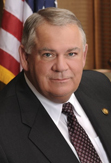COVID-19 Impacting Georgia Election Plans
The public health crisis caused by the COVID-19 coronavirus could force further changes in the state’s election calendar.
Dave Schechter is a veteran journalist whose career includes writing and producing reports from Israel and elsewhere in the Middle East.

The questions around Georgia’s scheduled June 9 primary election include:
Should we?
How do we?
Will we?
The primary is when Republicans and Democrats select their nominees for the Nov. 3 general election from the President and U.S. Senate down through state, county and municipal races. The deadline to register to vote in the primary is May 11. Georgia is an open primary state, meaning that registered voters do not have to be members of a party to vote in that party’s primary.
The March 24 Democratic presidential primary was postponed and moved to June 9 because of the public health crisis. The Democratic ballot will show 12 presidential candidates, even though all but two have withdrawn or halted their campaigns. Early voting for the Democratic presidential primary was suspended March 19 after more than 275,000 people had cast ballots. Those who already voted in the presidential primary will not find that race on their ballot.

Should the state hold a primary election in the midst of a public health crisis? Should the primary be moved to July or August, presuming, of course, that by then the spread of the virus has been arrested and some semblance of public activity can resume?
How to conduct the election is a tricky issue. Many of the men and women who work the polling places are senior citizens, among those most vulnerable to the virus. Secretary of State Brad Raffensperger, whose office oversees elections, has said that younger poll workers will be needed.
In-person voting would have to be conducted in a way that protects the health of poll workers, maintains social distancing, and prevents the spread of the virus through the touch-screens voting machines.
Some 6.9 million eligible voters on the state’s rolls are being mailed an absentee ballot request form. Once filled out and mailed back (voters paying the 55-cent postage), the state will mail the Democratic or Republican ballot, as requested. Voting by mail is controversial in some political quarters, but it does reduce the number of people venturing out in public.
Absentee ballots accounted for about 7 percent of the ballots cast in the 2018 general election, a figure expected to increase this year.
The decision as to whether the primary election will remain on June 9 is in the hands of Gov. Brian Kemp and Raffensperger, both Republicans. Kemp has said that his current emergency powers, which expire April 13, do not give him authority to change the date of an election in May.

According to the Atlanta Journal-Constitution, Raffensperger said that moving the primary from June 9 would require either an executive order from Kemp or action by the state legislature, which suspended its session March 12 because of the coronavirus threat.
“Elections are part of America’s critical infrastructure. They must go on, as they have in our history during civil war, crushing recessions and deadly epidemics,” Raffensperger told the Atlanta Journal-Constitution.
The state Democratic party wants the election held as scheduled, with expanded mail-in voting. The 11 Georgia Republicans in the U.S. House and Senate sent Raffensperger a letter encouraging him to change the date.
Speaking about the potential of large numbers voting by absentee ballot, Georgia House Speaker David Ralston, a Republican, told Fetch YourNews, based in north Georgia, “This will be extremely devastating to Republicans and conservatives in Georgia. Every registered voter is going to get one of these. … This will certainly drive up turnout.”
As for the candidates, at all levels the usual forms of campaigning are out. No pressing the flesh. No kissing babies. Campaigning via social media and video conferencing have replaced public events and meet-and-greets in supporters’ homes.
You can register to vote online at: https://registertovote.sos.ga.gov/GAOLVR/



comments